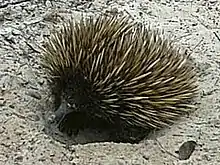prototherian
English

The echidna, an example of a prototherian
Etymology
From Prototheria, from Ancient Greek πρωτο- (prōto-, “proto-, first”) + θηρίον (thēríon, “beast”); + -ian.
Pronunciation
- IPA(key): /ˌpɹoʊtɵˈθɪəɹi.ən/
Adjective
prototherian (comparative more prototherian, superlative most prototherian)
- Belonging or pertaining to the subclass Prototheria of monotremes.
- 1889, Henry Alleyne Nicholson, Richard Lydekker, A Manual of Palæontology, 3rd edition, William Blackwood and Sons, page 1290:
- It is evident that the Edentates are widely separated from all other existing Eutherians; and Professor W. K. Parker, in view of the tendency to a variation in the number of cervical vertebræ and other features, has suggested a separate origin from a Prototherian stock.
- 1970, William A. Clemens, “Mesozoic Mammalian Evolution”, in Annual Review of Ecology, Evolution, and Systematics, volume 1, page 363:
- In his classification of prototherian mammals Hopson (31) queried the allocation of Haramiyidae to the Multituberculata and suggested that multituberculates were derived from a morganucodontid ancestry.
- 2000, Monroe W. Strickberger, Evolution, third edition, Jones and Bartlett Publishers, →ISBN, pages 446–447:
- […]the modern remaining prototherian lines are the Australian and New Guinean monotremes, egg-laying mammals now represented by the grub- and shrimp-eating platypus (Ornithorhyncus) and ant-eating echidna (Tachyglossus and Zaglossus).
Noun
prototherian (plural prototherians)
- Any of the egg-laying mammals of the subclass Prototheria; a monotreme.
- 1999, George A. Feldhamer, Mammalogy: Adaptation, Diversity, and Ecology, McGraw-Hill, →ISBN, page 192:
- Monotremes (prototherians), which include the duck-billed platypus, and short- and long-beaked echidnas, have a cloaca—a single opening for the fecal, urinary, and reproductive tracts.
Translations
Translations
|
This article is issued from Wiktionary. The text is licensed under Creative Commons - Attribution - Sharealike. Additional terms may apply for the media files.